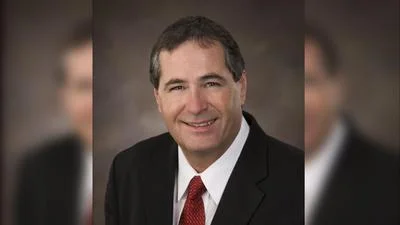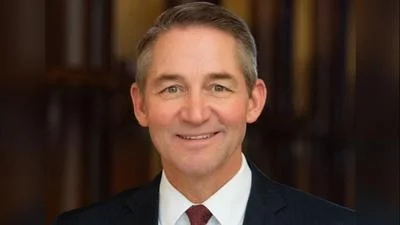Senator Kevin Cramer | Senator Kevin Cramer Official website
Senator Kevin Cramer | Senator Kevin Cramer Official website
BISMARCK—U.S. Senator Kevin Cramer (R-ND), member of the Environment and Public Works (EPW) Committee, penned an op-ed in the Wall Street Journal on the principles needed to reach a commonsense agreement between Republicans and Democrats on transmission.
“Democrats have made clear transmission policy will be part of any permitting deal. They are set to propose a requirement that regional grid operators transfer electricity to neighboring regions when another has a shortage. This would force an infrastructure build-out to facilitate that exchange. Some also think the federal government should be able to take over projects that states have nixed or that are taking too long to consider. While both policies are supposed to make the grid more resilient, they are particularly aimed at propping up green energy by spreading the costs of its transmission,” wrote Senator Cramer.
“Too often, advocates of transmission reform portray states as the problem. They claim states are too slow and self-interested, but as a former state utility regulator, I disagree. While generation and interstate transmission can be complicated, federal involvement can pile on even more bureaucratic complexity,” continued Senator Cramer.
“In the end, the user-pays principle must prevail instead of allowing some states to impose their green agendas beyond their borders. If Minnesota wants all renewables, they, not North Dakotans, should bear the cost. Last year’s discussions fell short largely because transmission policy lacked clarity, permitting reforms lacked teeth, and the whole process lacked public scrutiny. Even though I voted no, I committed to being a willing partner. Momentum is positive, and if we stay within the rails, we can get this done right,” concluded Senator Cramer.
How to Keep Electricity Flowing
By Senator Kevin Cramer
5.30.2023
Permitting has finally risen to the top of the agenda in Washington. After hearing Republicans advocate reform for years, Democrats have realized that offshore wind turbines, solar farms and lithium mines are stuck in the same maze as every other federal project. Thankfully, members of Congress are proposing solutions. A major sticking point last time reform was attempted was transmission, or how electricity is delivered across the country. But it doesn’t need to be a polarizing topic.
Democrats have made clear that transmission policy will be part of any permitting deal. They are set to propose a requirement that regional grid operators transfer electricity to neighboring regions when another has a shortage. This would force an infrastructure build-out to facilitate that exchange. Some also think that the federal government should be able to take over projects that states have nixed or that are taking too long to consider. While both policies are supposed to make the grid more resilient, they are particularly aimed at propping up green energy by spreading the costs of its transmission.
Despite the parties’ differences, Republicans should engage. We all want reliable, affordable electricity, and this is something for which Americans increasingly struggle. For years, the North American Electric Reliability Corp. has warned of resource adequacy shortfalls. Recently, Federal Energy Regulatory Commissioner Mark Christie testified that the U.S. electric grid is “heading for a very catastrophic situation in terms of reliability.” The point was reiterated by other FERC officials. Texas and California have experienced rolling brownouts and blackouts when demand exceeds generation. New England’s natural-gas pipeline constraints have led its grid operator to propose a costly solution: paying power producers to store fuel oil on site in case of emergency or high demand.
Lawmakers can reach a reasonable solution, but reforms must benefit all projects, not only the Democrats’ favored few. And more federal intervention shouldn’t be the default. Pipelines, roads, and power lines with a federal nexus all need Clean Water Act discharge permits, rights of way, Endangered Species Act consultations, and National Environmental Policy Act compliance. These federal hurdles make things harder on green and nongreen projects alike.
Too often, advocates of transmission reform portray states as the problem. They claim states are too slow and self-interested, but as a former state utility regulator, I disagree. While generation and interstate transmission can be complicated, federal involvement can pile on even more bureaucratic complexity. When I served on the North Dakota Public Service Commission, even our slowest decisions would put the FERC’s speediest ones to shame. Our commission granted an application to double the capacity of a gas processing plant in three months. Contrast that with the Council on Environmental Quality’s 2020 report showing the average time for an environmental impact statement across all federal agencies was 4½ years. When Washington steps in, tone-deaf inefficiency comes with it.
There are some areas in which the federal government could be useful, but it would be through refining the processes by which Washington already wields authority rather than granting it more power. As the law is now, the federal government can take over the siting and permitting of certain transmission lines if a state has failed to reach a conclusion on a project a year after it received an application. Like every other major piece of infrastructure, transmission projects are costly investments, and a federal backstop can offer helpful reassurance that a project won’t be stuck in regulatory limbo.
But even with reforms, federal behemoths will simply be less nimble than state regulators. Rather than relegating state officials to obscurity, their involvement should be prioritized in the hope they greenlight projects before cumbersome federal bureaucracies take over.
Some Democrats have proposed the FERC mandate that regional transmission organizations, or RTOs, facilitate minimum transfer capabilities. It’s pitched as akin to a neighbor borrowing a cup of sugar. An RTO would be required to build enough transmission to share a percentage of its power with a neighbor when they are in need. But the NERC’s most recent blackout warnings indicate capacity shortfalls, not excess that can be shared. Their report described two recent widespread weather events where neighboring RTOs were unable to share resources because they were both facing simultaneous resource-adequacy issues.
Federally mandating certain levels of regional connections wouldn’t help either. It’s contrary to a regulatory standard of prudence and is a step toward grid nationalization. While there is a large interconnection queue of renewable generation waiting to come online, it’s only as dependable as the weather and can cause greater system instability. Clean, reliable solutions like CCUS—carbon capture, usage, and storage—and nuclear power are available, but only if lawmakers counter the religiosity of the renewable-only generation.
The feds should also stay out of cost allocation. It’s an understandable impulse for Washington to involve itself, given that allocating who pays for what will be a complex part of transmission. But determining who covers the bill for a project is beyond the scope of permitting. No matter what, new transmission will show up on utility bills, and it won’t be a small cost. FERC and state regulators are familiar with the “just and reasonable” standard for electricity rates, but proposals thus far have muddied the waters, with some claiming transmission costs should be broadly disbursed rather than targeting those who benefit.
In the end, the user-pays principle must prevail instead of allowing some states to impose their green agendas beyond their borders. If Minnesota wants all renewables, they, not North Dakotans, should bear the cost.
Last year’s discussions fell short largely because transmission policy lacked clarity, permitting reforms lacked teeth, and the whole process lacked public scrutiny. Even though I voted no, I committed to being a willing partner. Momentum is positive, and if we stay within the rails, we can get this done right.
Original source can be found here.






 Alerts Sign-up
Alerts Sign-up